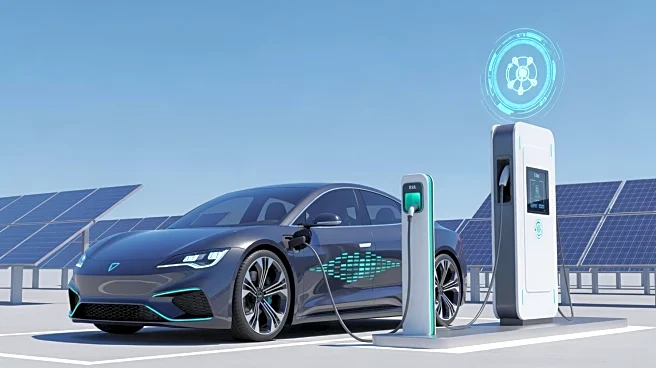What's Happening?
Australia has announced a groundbreaking initiative to provide households with three hours of free electricity daily, leveraging its abundant solar power capacity. The 'Solar Sharer' scheme will be rolled
out in New South Wales, South Australia, and Queensland starting July 2026, with nationwide implementation by 2027. This initiative aims to utilize excess solar energy generated during the day, addressing grid strain during peak evening hours. Australia leads in solar deployment, with 42 gigawatts of installed capacity, and plans to add another 40 gigawatts by 2030. The scheme is designed to ensure equitable access to solar power, particularly benefiting those without personal solar installations.
Why It's Important?
Australia's initiative could serve as a model for other countries seeking to maximize solar energy use and reduce electricity costs. By providing free electricity, the scheme promotes energy equity, allowing all citizens to benefit from solar power regardless of their ability to install panels. This could lead to significant savings for consumers, particularly lower-income households, and encourage behavioral changes in energy consumption patterns. The initiative also highlights the potential for government-led energy policies to drive innovation and sustainability, setting a precedent for other nations to follow.
What's Next?
As the 'Solar Sharer' scheme is implemented, Australia will need to address potential challenges, such as ensuring grid stability during periods of low solar generation and preventing electricity suppliers from raising prices at other times. The government will also need to monitor the impact on solar installation incentives, as free electricity could dissuade new investments in personal solar systems. Other countries will likely observe Australia's progress closely, considering similar policies as they expand their solar capacities.
Beyond the Headlines
The initiative raises questions about the long-term implications of free electricity on consumer behavior and energy market dynamics. It could lead to increased demand for smart appliances and energy storage solutions, as consumers seek to optimize their use of free power. Additionally, the scheme may influence global energy policy discussions, emphasizing the role of government intervention in accelerating the transition to renewable energy sources.










